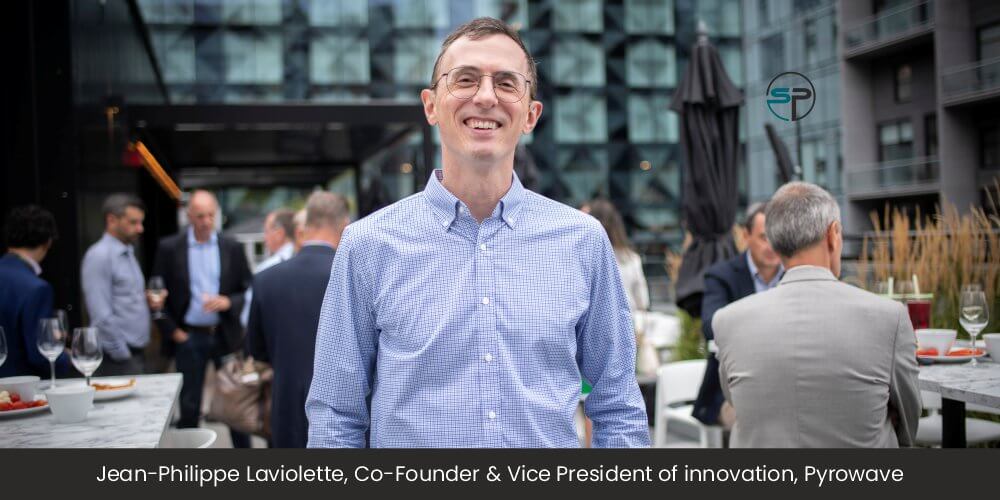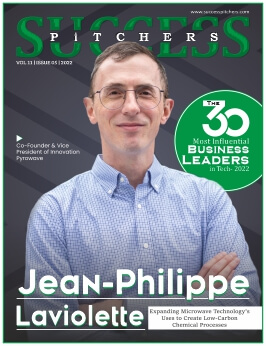Jean-Philippe Laviolette: Expanding Microwave Technology's Uses to Create Low-Carbon Chemical Processes
The 30 Most Influential Business Leaders in Tech-2022

Given that the production of chemicals is responsible for 4% of the world’s greenhouse gas emissions, it will require drastic cuts in emissions from the chemical industry for the world to keep below the limit of a 1.5C temperature rise, the agreed upon COP27 CO2 reduction target by experts and governments. By adopting already-practiced methods like recycling plastic and using fertilizer more wisely, as well as by investing in cutting-edge technologies like hydrogen, the industry could quickly reduce its emissions. In light of this, Jean-Philippe Laviolette, co-founder and vice president of innovation at Pyrowave, seeks to contribute to the development of the next generation of low-carbon chemical processes.
Below are highlights of the interview:
Tell us about your journey and what did you do before starting your professional career?
I’ve always been passionate about science and technology since I was a kid, and I’ve always been drawn to science fiction. I knew pretty early on that I would pursue projects or a career as a scientist or engineer. My initial motivation was a desire to work in the space industry, among the stars.Then, as I went to college, I got more and more involved in chemical processes, and that’s what really caught my attention. I pursued a PhD because I always knew I wanted to play a leading role in the development of new technologies, so I needed to have all the tools and knowledge to do that.
After my doctoral studies, I started working to gain hands-on industrial experience. This gave me the experience I needed to do problem solving-oriented research. My industrial experience taught me about efficiency and goal achievement. After a few years at Rolls Royce, I was ready to embark on a journey as a researcher/entrepreneur, to have the freedom to work ’outside the box’. I then decided to go back to a position at the university that allowed me much more freedom in the research I was doing. That’s when I got involved in the Pyrowave project.
After co-founding Pyrowave, I have worked relentlessly for the past 11 years to build a robust microwave technology platform. Pyrowave has developed a disruptive technology that replaces traditional energy-intensive chemical processes powered by fossil resources with high-intensity, low-carbon microwave technology, and it is completely electric. This technology has opened new research fields, and its applications are numerous. As VP of Innovation, I oversee the R&D team, and together we work at optimizing our current processes, expanding the applications of microwave technology, and generating intellectual property.
What was the motivation behind founding Pyrowave?
The main reason that motivated us to start the Pyrowave adventure with Jocelyn Doucet, the co-founder and CEO of Pyrowave, was to tackle a difficult problem in order to have a positive impact on society and the world. I always knew I wanted children, and I became a father early on in this adventure. It’s motivation to leave them a better world.
When we started Pyrowave, the widespread use of plastics and the environmental issue of plastic waste end-of-life were not as much of a worldwide priority as they are today, so I am proud that we worked on something useful and that the technology is now ready while everyone is looking for a solution.
Tell us more about the company’s tech offerings and how it is revolutionizing the industry?
Pyrowave offers the first industrial application of microwaves for chemical industry/processing. The first application targets polystyrene, a leading technology for this traditionally hard-to-recycle material. Our technology converts polystyrene back into the styrene monomer, its basic, virgin-like building block, so that it can be reused infinitely to make high-quality recycled polystyrene, but with a much lower environmental footprint. It’s the most advanced technology to enable the circular economy of plastics. Our technology has been chosen by the industrial leader Michelin, with whom we established a partnership to develop our first commercial plant in Europe, which will be in operation by 2024.
We apply our microwave technology to polystyrene; however, our vision is much wider and more ambitious, as we aim to contribute to the shift towards a greener chemical industry by developing new chemical reactors that use electricity.
We base our success on the last decade, as we managed to master the use of microwaves to power chemical processes, build an experienced team with practical and hands-on experience in the chemical industry, and have an openness to question old paradigms. Our approach has always been to go back to the fundamentals and bring forward simple solutions to complex problems. But it’s a lot of work to achieve simplicity!
Our ultimate objective is to contribute to developing the next generation of low-carbon chemical processes.
What are your major roles and responsibilities at the company?
As VP of Innovation and co-founder of Pyrowave, I serve as a library, having experienced all the iterations of the technology. My responsibilities include leading the R&D efforts and mentoring talents to develop new applications that we hope will contribute to the electrification of the chemical industry and the development of the next generation of low-carbon chemical processes.
In order to reach this goal, my role is also to continue building a diversified and cutting-edge team of scientists and engineers to contribute to this effort. Our microwave innovation center has now become a leader in the development of the new low-carbon chemical industry. I’m also responsible for the intellectual property strategy, to protect all the knowledge we develop.
In terms of vision, I ensure that we have a coherent strategy that is executed with the highest possible level of scientific rigor as well as respecting our environmental mission and values. We apply our know-how to develop efficient and low-carbon innovations for tangible problems.
What significant changes have happened in the tech sector in the past years, and which modern technologies have disrupted the chemical industry?
Climate change has created pressure on society as well as on the cleantech sector to reduce greenhouse gas emissions.
In addition, the scarcity of energy and resources has created tremendous pressure on industrial leaders, who are now turning to us for energy-efficient solutions. The rise of renewable sources of electricity has led to a low-carbon chemical industry that uses electricity as a source of energy instead of fossil resources.
However, using electricity as a source of heat is a known approach. But using an electricity-powered microwave as a source of heat creates a range of untapped possibilities for making chemical processes more efficient.
What has been the best recognition that you have received as a professional?
We had three partners when we started Pyrowave 11 years ago.Eleven years later, we are now a team of close to 40 people, all motivated by having a positive impact and making the world a better place. Seeing this group of young, dynamic professionals work towards this common goal is one of the most precious recognitions that life has given me.
Where do you see yourself and the company in upcoming years?
I hope Pyrowave will become a global contributor to solving waste recycling problems and electrifying the chemical industry. To achieve this vision, I see the company growing and diversifying its activities worldwide to offer a range of technological solutions to waste recycling and to counter global warming.
On a human level, I see Pyrowave contributing to the training of a new generation of professionals that are more environmentally conscious and driven to find solutions to the world’s problems.
To conclude, I see myself being involved in all the technological developments while giving an increased amount of freedom to this new generation of professionals to develop new ideas.
Website: www.pyrowave.com










